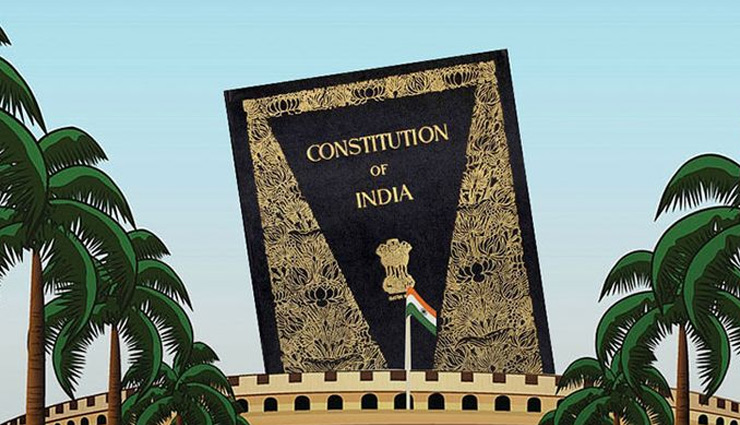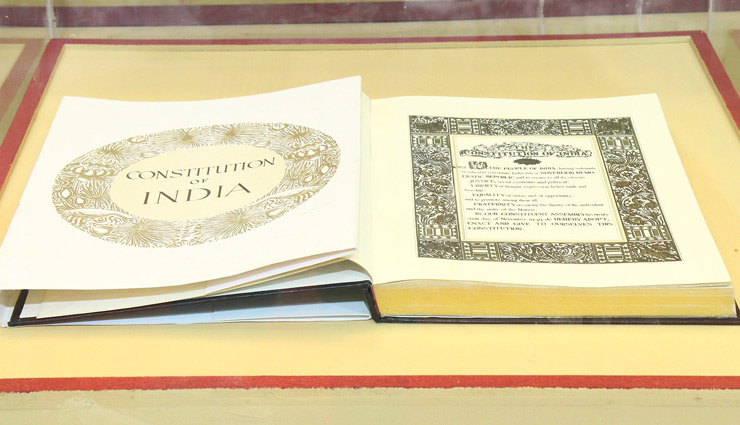Republic Day 2019- Major Constitutional Amendments That Changed The Course Of India
By: Priyanka Maheshwari Mon, 21 Jan 2019 11:46:06

The 2019 Republic Day marks 70 years of the great Indian Constitution. The Constitution of India is the principal document that formulates the rights, duties and powers of citizens, governments and its officials. The constitution came into force on 26 January 1950, took nearly three years to complete, and is regarded to be the world’s most extensive Constitution.
However, as our society and its needs are ever-evolving, if the constitution does not keep pace, it will become redundant or lead to break down of law and order.
So, as an advancing and subsisting document, numerous amendments have been made to it till 2016. Amendments to the Constitution require a special majority of ‘two-third’ members present and voting to be passed in Parliament.
Here are 9 of the most significant amendments:
* Abolition of states according to classes and the introduction of Union Territories and reorganisation of states by language (1956)
This was one of the first significant reforms of the boundaries of Indian states and territories, organising them by the language spoken in those areas. This systematically arranged the states and lowered the complexity of state boundaries. Apart from this, it also abolished the classification of states by progress and per-capita income of the states.
* The mini-constitution (42nd amendment) inserted Socialism and Secularism in the preamble, a provision on fundamental (1976)
Secularism and socialism were inserted to restore the faith of the nation that minorities would be safe and not be exploited by the rich strata. Also, the rich would not be allowed to dominate the country’s economy.The main reason to add socialism was to promote social as well as economic equality in the country. Similarly, the main reason to add secularism was to imply that there was no official state religion of the country.

* Right to Property deleted from the list of fundamental rights (1978)
The fundamental right to property in India was removed to permit the reorganisation of land and to facilitate land acquisition for developmental projects.This was carried out by the Indian government at that time since it was not affluent enough to pay people whatever they demanded their land.
* Lawmakers may be disqualified on the grounds of defection (Law of Defection) (1985)
This was quite a controversial amendment in itself since it was felt that this law would invade on the right of free speech of lawmakers. Under the amendment, a Member of Parliament or state legislature was considered to have defected if they either on their own resigned from their party or violated the directions of the party leadership on a vote. That is, they may not vote on any issue in violation to the party’s decision. Independent members would be disqualified if they joined a political party. Nominated members who were not members of a party could choose to join a party within six months; after that period, they were treated as a party member or independent member.
* Voting age reduced from 21 to 18 (1989)
The then Prime Minister Rajiv Gandhi explained it as an expression of the government’s full faith in the youth of the country. The youth are aware and informed and thus, lowering of the voting age would provide an opportunity to the unrepresented youth of the nation to vent out their feelings and motivate them to become a part of the political process eventually.
* Introduction of Nagarpalikas and Municipalities (1993)
During the early 90s local bodies in states had become ineffective in holding regular elections or the maintenance of public infrastructure, electricity and water supply. Thus, an immediate need to introduce effective authorities to execute the numerous plans and programs was felt by the government.
* Free and compulsory education to children between 6 to 14 years (2002)
One of the most important amendments, the government directed private schools to take 25% of their class strength from economically weaker or disadvantaged groups of society through a random selection process with the help of the government funding.This initiative was taken to try and provide elementary education to all. Moreover, the local and state governments were made to ensure its proper implementation.
* Allowed the government to pass laws relating to reservations to socially, economically backward classes, scheduled castes and scheduled tribes in public and private higher educational institutions (2014)
Scheduled castes and scheduled tribes have been the most neglected and exploited people in India. The curse of untouchability has always been a dark spot on Indian civilisation and culture. Despite the constitutional declaration of its abolition under Article 17, it was still quite prevalent in many subtle and not so subtle ways. Therefore, for the very integrity, survival and the nation’s unity the amendment to pass laws relating to such reservations were quite a need of the hour.
* Introduction of the Goods and Services Tax (GST), to present the idea of One Nation, One Tax (2016)
The most recent important amendment came with the implementation of the GST, where consumers would not be subjected to double/ multiple taxations. All taxes that are imposed while purchasing goods will include both the central government’s taxes as well as the state government’s taxes. The introduction of GST has deterred the state governments from randomly increasing taxes.





